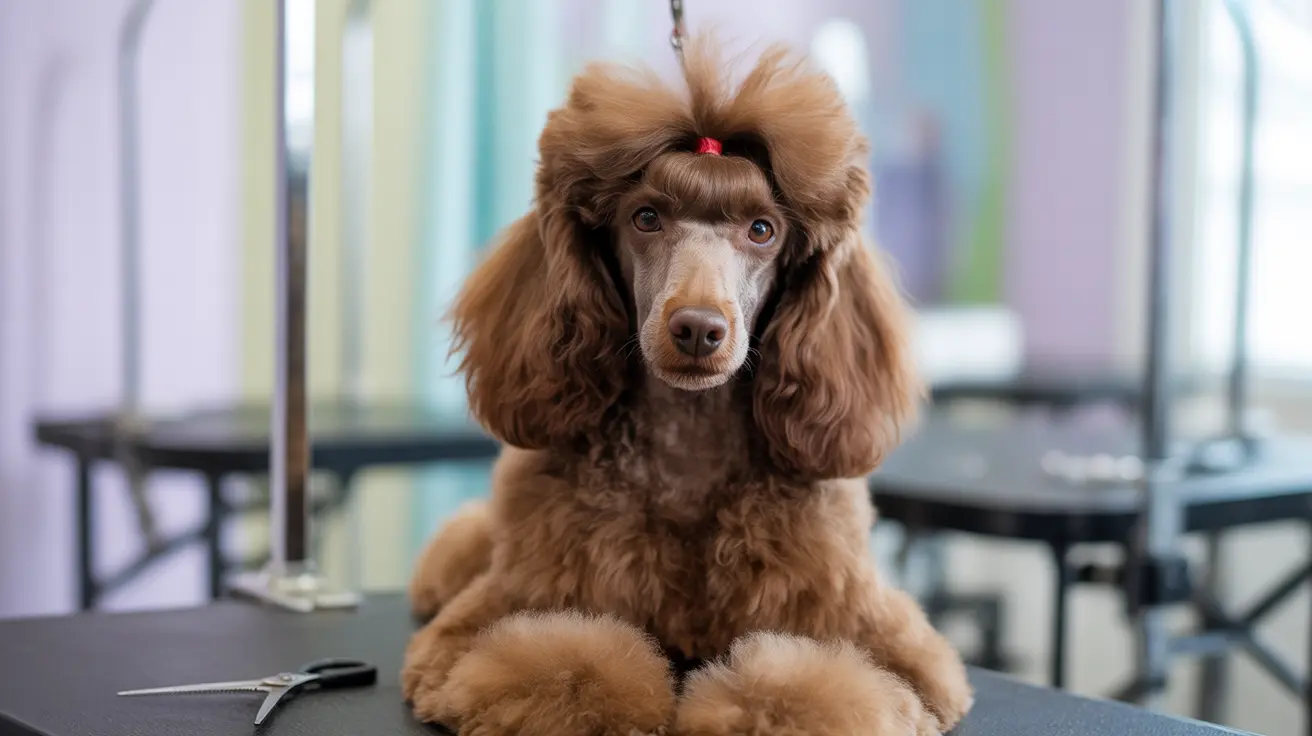Brown Poodles, with their rich chocolate-colored coats and intelligent expressions, represent one of the most striking color variations in the Poodle family. Whether you're considering adding one to your family or simply curious about this distinguished breed color, understanding their unique characteristics and care requirements is essential.
These elegant dogs combine the Poodle's renowned intelligence with a stunning coat color that ranges from deep chocolate to lighter café-au-lait shades. Their distinctive appearance is the result of specific genetic factors, making them particularly special among the Poodle varieties.
The Genetics Behind Brown Poodles
Brown Poodles get their distinctive color from a specific genetic makeup involving the B-Locus gene. This gene determines whether a Poodle will display brown coloration, with two copies of the recessive b allele (bb) necessary for the brown coat to appear. This fascinating genetic process explains why brown Poodles can sometimes produce puppies of different colors when bred.
The intensity of the brown color can vary significantly, from deep chocolate to lighter shades, all determined by additional genetic factors. This variation in brown tones makes each Brown Poodle unique and adds to their appeal as companion animals.
Caring for Your Brown Poodle's Coat
Brown Poodles require special attention to maintain their beautiful coat color and texture. Their non-shedding coat needs regular grooming to prevent matting and maintain its rich chocolate hue. Regular brushing, at least 2-3 times per week, helps distribute natural oils and prevent tangles.
Professional grooming every 4-6 weeks is essential to maintain the classic Poodle look and keep the coat healthy. Brown Poodles may be particularly prone to coat fading when exposed to excessive sunlight, so proper protection and care are crucial to maintain their rich color.
Health and Temperament
Like all Poodles, brown varieties are intelligent, active, and highly trainable. They excel in various activities, from obedience training to agility sports. Their alert nature makes them excellent watchdogs, while their affectionate personality makes them perfect family companions.
Health-wise, Brown Poodles share the same considerations as other Poodle colors, including potential issues with hip dysplasia, eye problems, and skin conditions. Regular veterinary check-ups and proper preventive care can help ensure a long, healthy life spanning 12-15 years.
Exercise and Training Requirements
Brown Poodles thrive with regular exercise and mental stimulation. Daily walks, interactive play sessions, and training exercises help maintain their physical and mental well-being. Their high intelligence means they quickly learn new commands and tricks, making training sessions both productive and enjoyable.
Early socialization is crucial for developing well-adjusted adult dogs. Exposure to various people, pets, and situations helps prevent anxiety and promotes confident behavior.
Frequently Asked Questions
Why do Toy Poodles need regular grooming, and how often should I brush their coat?
Toy Poodles need regular grooming because their continuous-growing, non-shedding coat can easily become matted without proper care. Daily brushing is ideal, but at minimum, brush 2-3 times per week and schedule professional grooming every 4-6 weeks.
How do I prevent matting and tangling in my Toy Poodle's curly hair?
Regular brushing with appropriate tools (slicker brush and metal comb), keeping the coat clean and dry, and maintaining regular professional grooming appointments are essential for preventing mats and tangles.
What are the best ways to keep my Toy Poodle's ears clean and prevent infections?
Check and clean ears weekly using a veterinarian-approved ear cleaner, keep the ear canal dry during baths, and maintain proper airflow by keeping ear hair trimmed.
How much exercise does a Toy Poodle need daily, and what activities are best suited for them?
Toy Poodles need 20-30 minutes of exercise daily, split into two sessions. Suitable activities include short walks, indoor play sessions, fetch games, and basic training exercises.
What are common health issues in Toy Poodles, and how can regular care help prevent them?
Common health issues include dental problems, patellar luxation, and eye conditions. Regular veterinary check-ups, proper dental care, maintaining a healthy weight, and appropriate exercise can help prevent or manage these conditions.
Whether you're considering adding a Brown Poodle to your family or already share your life with one, understanding their unique characteristics and care requirements will help ensure a happy, healthy life together. Their stunning coat color, combined with the breed's legendary intelligence and adaptability, makes Brown Poodles truly special companions.






